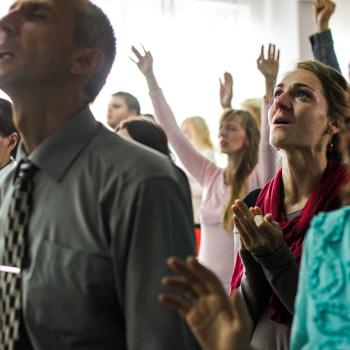A single subject has dominated insider-LDS discussions this week: the shake-up in leadership at the Maxwell Institute, BYU's institutional organ for Mormon apologetics or, depending on how one augurs the future, secular-style religious studies. The political complexities of the situation are labyrinthine, beyond my knowledge and interest, and I have no further ink to spill on the topic. Many more connected and invested observers have read just about every tea leaf in sight.
But the situation has prompted me to investigate John Dehlin's Mormon Stories project, since Dehlin and his group are connected—or not—in oblique ways to the Maxwell Institute upheaval. Mormon Stories is an online community centered on a series of podcasts exploring controversial elements of Mormonism and the process of moving away from typical forms of church membership and belief. Dehlin is a charismatic figure and a lightning rod for the cultural tensions the church is experiencing in this political moment, and he has attracted both adulation and criticism. Dehlin's motives, the legitimacy of his claim on Mormonism, and the wisdom of his tactics have all been questioned. I don't find those questions illegitimate per se, but I suspect that the answers will remain opaque—even to Dehlin and the other Mormon Stories leaders—for some time.
What is currently available for investigation are the goals of the Mormon Stories organization, at least as stated on their website. Dehlin has described the genesis of his organization as a personal crisis in 2001, when he discovered some basics of early church history and was thrown into confusion. By his own account, there were no interpretive resources available in 2001 to help him make sense of these issues, and Mormon Stories was born to fill that void: through a series of podcasts, Dehlin would develop a repository of unbiased historical information and interpretation to bring to light and make sense of the issues he encountered.
In one sense, this is a bit silly: in 2001, there were numerous Mormon journals—including BYU Studies, Dialogue, Sunstone, Irreantum, and others—that had been dealing with precisely these issues for decades, and by 2004, long before Mormon Stories got started, the Mormon blog-world was well launched on its treatment of the same. To my knowledge, Mormon Stories has not brought to light any new historical knowledge or even any novel historical interpretation; the organization does not fill any actual intellectual void.
What was novel about Dehlin's project, it seems to me, was its non-textual platform—podcasts rather than essays or articles—and the edge of anger in the social community surrounding the podcasts that was generally taboo in mainstream Mormon blog discussions at the time. This anger brought an energy to the community ethos, and thus an intensity to the social bonds formed there. This is hardly a remarkable achievement: feelings of community are easy to generate on the internet simply by provoking any intense emotion in the audience and providing a place for discussion. Still, it did represent a novel contribution to the landscape of Mormonism.
Mormon Stories thus defines itself on two axes: both as a supportive social ecosystem, and as a purveyor of what it calls "authentic self-expression." These two goals are, of course, in direct conflict with one another. It's not entirely clear what is meant by "authentic self-expression," and in any case I am one who doubts that anything like authentic self-expression—or even anything like an "authentic self"—actually exists. But conceding for the sake of argument that some kind of personal communication can spring directly from the soul, unmediated by environment or exigency, surely a vibrant social community is the last place one would expect to find such authentic expression. A social community is nothing more than a source of mediating narratives, names, and norms that exist precisely to shape the substrate of basic human perception into meaningful experience. If "authentic" expression is language that arises directly from an unadulterated private conscience, then expression from within a community can only be seen as artificially mediated—it's simply the nature of the thing. This point was made directly by Laurel Thatcher Ulrich in her talk at the meeting of the Boston Mormon Stories community, though she was gracious enough not to draw out the obvious and dismaying implications for her audience.





